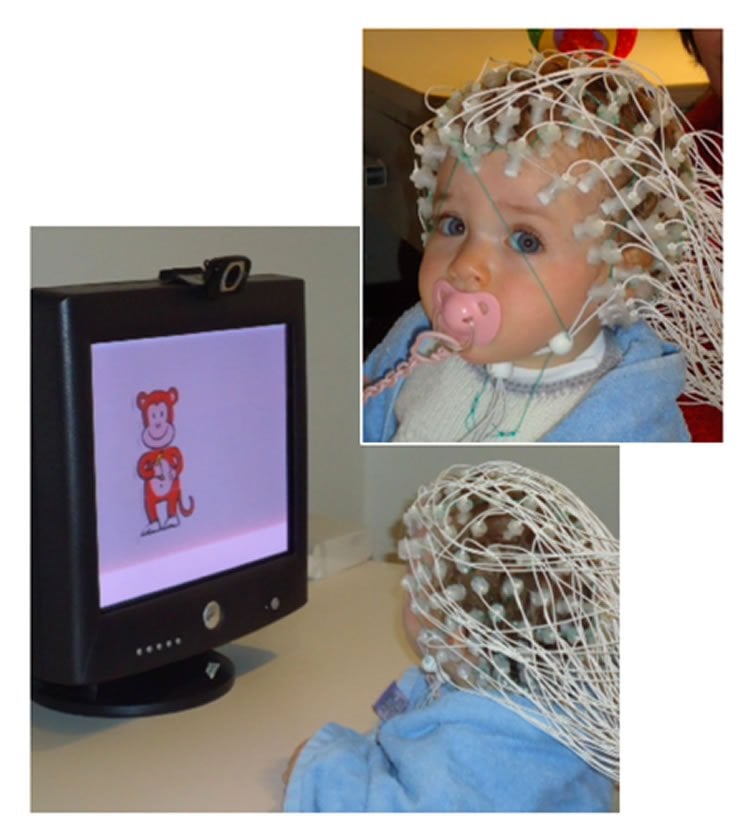Summary: Toddlers who come from a more impoverished background show more immature brain function and less of an ability to detect errors, a new study reports.
Source: University of Granada.
A study carried out by the University of Granada reveals that familial poverty has an impact on the toddlers’ brain function. Infants of families with lower economic resources and a lower level of education, present a more immature functioning and less ability to detect errors.
The study comprised of 88 toddlers, aged 16 months. They had to observe how someone made a series of simple puzzles with which they had been previously familiarized.

Researchers measured the response of the toddlers brains by a high-density electroencephalogram, both when the puzzles were correctly completed and when they were incorrectly completed (for example, the legs and body of a chick with the head of an elephant).
As Charo Rueda, from the Department of Experimental Psychology of the UGR and lead author of this paper, explains, “the brain response when observing errors is well characterized in adults, and it’s an excellent measure of the brain system related to attention and learning”.
The research found the brain reaction of 16-month-old babies is very similar to that of adults with the same task, “which allows us to measure the efficacy of the attentional brain system in preverbal infants. This is important because this protocol may be of use for detecting early risks in the development of attention problems”, says Rueda.
However, the study has a second, even more interesting aspect: it establishes a relationship between the socioeconomic status of the family and the performance of the toddler’s brain when detecting errors. This is important, “since it shows that the parenting environment (educational and resource poverty) has an impact on the children’s brain functioning, early on,” the researcher commented.
Thus, the results indicate that the brain of toddlers raised in families with lower levels of education and resources show a more immature functioning. “This result highlights the impact that poverty may have on early brain development and the need to alleviate educational and economic inequalities for the proper development of the children”, Rueda concludes.
Source: University of Granada
Image Source: NeuroscienceNews.com image is credited to the researchers.
Original Research: Abstract for “Frontal theta activation associated with error detection in toddlers: influence of familial socioeconomic status” by Ángela Conejero, Sonia Guerra, Alicia Abundis-Gutiérrez, and M. Rosario Rueda in Developmental Science. Published online December 15 2016 doi:10.1111/desc.12494
[cbtabs][cbtab title=”MLA”]University of Granada “Familial Poverty Affects Toddlers’ Brain Function.” NeuroscienceNews. NeuroscienceNews, 18 April 2017.
<https://neurosciencenews.com/poverty-neurodevelopment-6437/>.[/cbtab][cbtab title=”APA”]University of Granada (2017, April 18). Familial Poverty Affects Toddlers’ Brain Function. NeuroscienceNew. Retrieved April 18, 2017 from https://neurosciencenews.com/poverty-neurodevelopment-6437/[/cbtab][cbtab title=”Chicago”]University of Granada “Familial Poverty Affects Toddlers’ Brain Function.” https://neurosciencenews.com/poverty-neurodevelopment-6437/ (accessed April 18, 2017).[/cbtab][/cbtabs]
Abstract
Frontal theta activation associated with error detection in toddlers: influence of familial socioeconomic status
Error detection is one of the functions of the executive attention network, a brain system involved in executive control that includes the anterior cingulate cortex and other prefrontal regions. Despite the key role of this function in a wide range of life outcomes, very limited research has examined the early development of the network and whether its functional efficacy is related to environmental factors. Electrophysiological studies with adults have shown oscillatory activity in theta (4–7 Hz) range arising from medial frontal cortex that follows the detection of self-committed or observed errors. In the current study, we designed a novel experimental procedure that involved a familiarization phase with simple three-pieces puzzles followed by an experimental phase in which toddlers observed the puzzles being formed either correctly or incorrectly. Observation of incorrect configurations produced increased potentials in midline channels and greater power theta activity for both toddlers (n = 56) and adults (n = 14). In addition, socioeconomic status of the family in general, and parental education in particular, contributed to individual differences in the amplitude of the error-related signal and associated theta power in toddlers, indicating that children raised in lower SES families show poorer activation of the executive attention network. These data demonstrate the influence of environmental factors at the earliest stages of development of the executive attention network. Importantly, the results show that error-detection EEG signals can be used as neural markers of the initial development of executive attention, which can be of great help for the early detection of risk for developmental disorders involving deficits in this function.
“Frontal theta activation associated with error detection in toddlers: influence of familial socioeconomic status” by Ángela Conejero, Sonia Guerra, Alicia Abundis-Gutiérrez, and M. Rosario Rueda in Developmental Science. Published online December 15 2016 doi:10.1111/desc.12494






